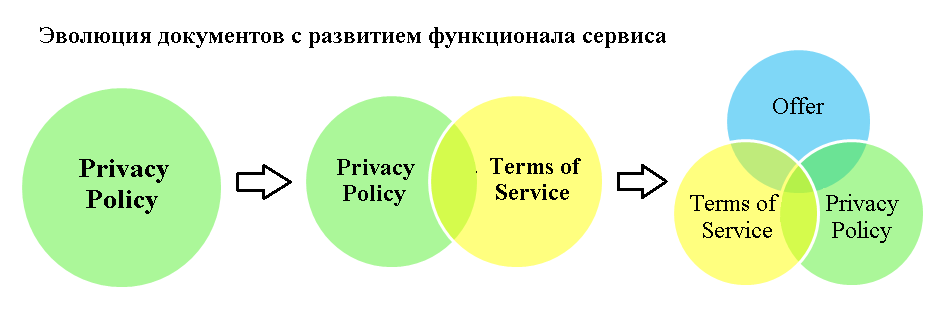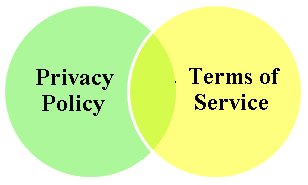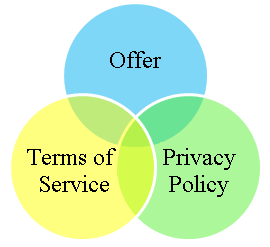Examples of documents for sites

At the request of clients for the preparation of legal documentation for websites, we see a confusion in the presentation of which documents are necessary and sufficient for an Internet site with a certain functionality.
At the first contact, customers call the user agreement or offer, putting different terms in these terms. At the exit, after discussing with the customer the features of his Internet project, we receive a whole package of documents, which, along with the user agreement, may include a public offer or service provision rules (TOS), a licensing agreement and a privacy policy.
We distinguish several legal schemes of interaction between the owner of the service and users, taking into account the functionality of various Internet projects. Based on the classification, it is recommended to use separate document packages for the main groups of Internet services.
')
What groups of sites it is customary to allocate and use documentation packages under the cat.
Why reinvent the wheel, making a user agreement that answers all questions at once? Your service may change the day after the launch. As a result, the user agreement will require detailed processing.
To do this, there are proven ways to structure the legal documentation of the site, which provide a smooth build-up or change of its functionality and methods of monetization without the need to recycle documents in the future.
The second advantage of the separation of documentation for the site on a functional basis is a significant reduction in the cost of its development. At a certain stage of development, we decided to use the accumulated development to reduce the cost of services by reducing the time to prepare legal documentation for similar Internet services.
Below is our classification of sites grouped by legally relevant functionality. Each type of site corresponds to a specific set of documents that are necessary and sufficient to resolve legal issues in connection with their operation.
1. Website with feedback form

Functional The user can read the information posted on the site and send requests to the site owner with the provision of their contact information.
Documents. Privacy Policy (see the sample design ).
By law, a person collecting personal data on the Internet must publish or otherwise provide unrestricted access to a document defining its policy regarding the processing of personal data and containing information about the realizable requirements for the protection of personal data (paragraph 2 of Article 18.1 of the Federal Law "On personal data ").
For violation of administrative responsibility and the possibility of blocking the site.
The requirements of the law are implemented by publishing the Privacy Policy on the website, which describes in detail the procedure for obtaining the user's consent to the processing of his personal data (name, phone number, address, etc.), the permitted methods and purposes for processing personal data, and the requirements for ensuring their privacy.
In addition, the Policy provides conditions for the use of impersonal information (cookies, IP, etc.) about the preferences, composition, location and behavior of users for marketing and advertising purposes.
The privacy policy in our editorial office does not require the user's written consent and registration in Roskomnadzor as an operator for the processing of personal data, which significantly reduces the risk of inspections and prosecution.
2. Website with personal account
 Functional. Reading materials, personal account. The advanced version includes social features for users to share their own content and share messages with each other.
Functional. Reading materials, personal account. The advanced version includes social features for users to share their own content and share messages with each other.Documents.
1. User agreement (see the design example )
2. Privacy Policy
In comparison with the first type of sites, the ability to actively use the functionality has been added, which requires agreement on the rules for its use. As a result, the User Agreement additionally appears.
The user agreement governs the general terms of registration and free use of the available functionality of the site.
The agreement addresses issues of responsibility for the placement of user-generated content, the conditions for granting and restricting access to the service, the procedure for changing the functionality and the agreement.
The Consumer Protection Act does not apply to the relations of the parties due to the free use of the site.
3. Online store
 Functional. View product catalog, personal account, remote sale of goods by the site owner.
Functional. View product catalog, personal account, remote sale of goods by the site owner.The package of documents for the online store includes the following forms:
1. Public offer (see the design example )
2. User Agreement
3. Privacy Policy
In this group, an additional opportunity has appeared to conclude sales contracts by remote means. This requires a document that describes the conditions of the transaction.
Public offer online store contains the necessary conditions for ordering goods on the site, their payment and delivery, warranty quality, return of goods and payment for the goods.
Additionally, the online store offer includes the conditions for applying a simple electronic signature to confirm actions using the personal account and email of the buyer and limiting the supplier’s liability. The limitation of liability of the online store in the event of the sale of goods under an agency agreement is established.
In order not to overload you with information, we have divided the material into several parts. In the next article we will look at the features of document packages for the trading platform, bulletin board and Internet service.
A source
Source: https://habr.com/ru/post/296304/
All Articles